All Management News
- Colour filled Republic Day celebration with the neighbours January 25, 2020
This year SRM AP celebrates Republic Day in the most unconventional way that has enabled the females of the district to come together and rejoice the occasion. Words went out a week ago to the women hailing from the adjoining villages-Nidamarru, Kurugallu, Neerukonda, Pedhaparimi that SRM AP will be hosting Republic Day themed Rangoli competition on 25th January, 2020 which will be open to all the women living in the district, students, faculty, and staff.
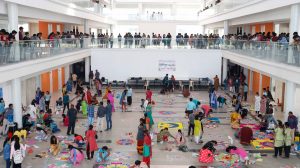
On 25th January, registration for the competition began early in the morning and was closed by 8 a.m. Close to 60 contestants participated, and each were given 5*5 feet of space in the atrium area to make rangoli. Cheered by ample spectators including students and inhabitants of the nearby villages, the participants transformed the floor of the atrium into picturesque blocks of art.
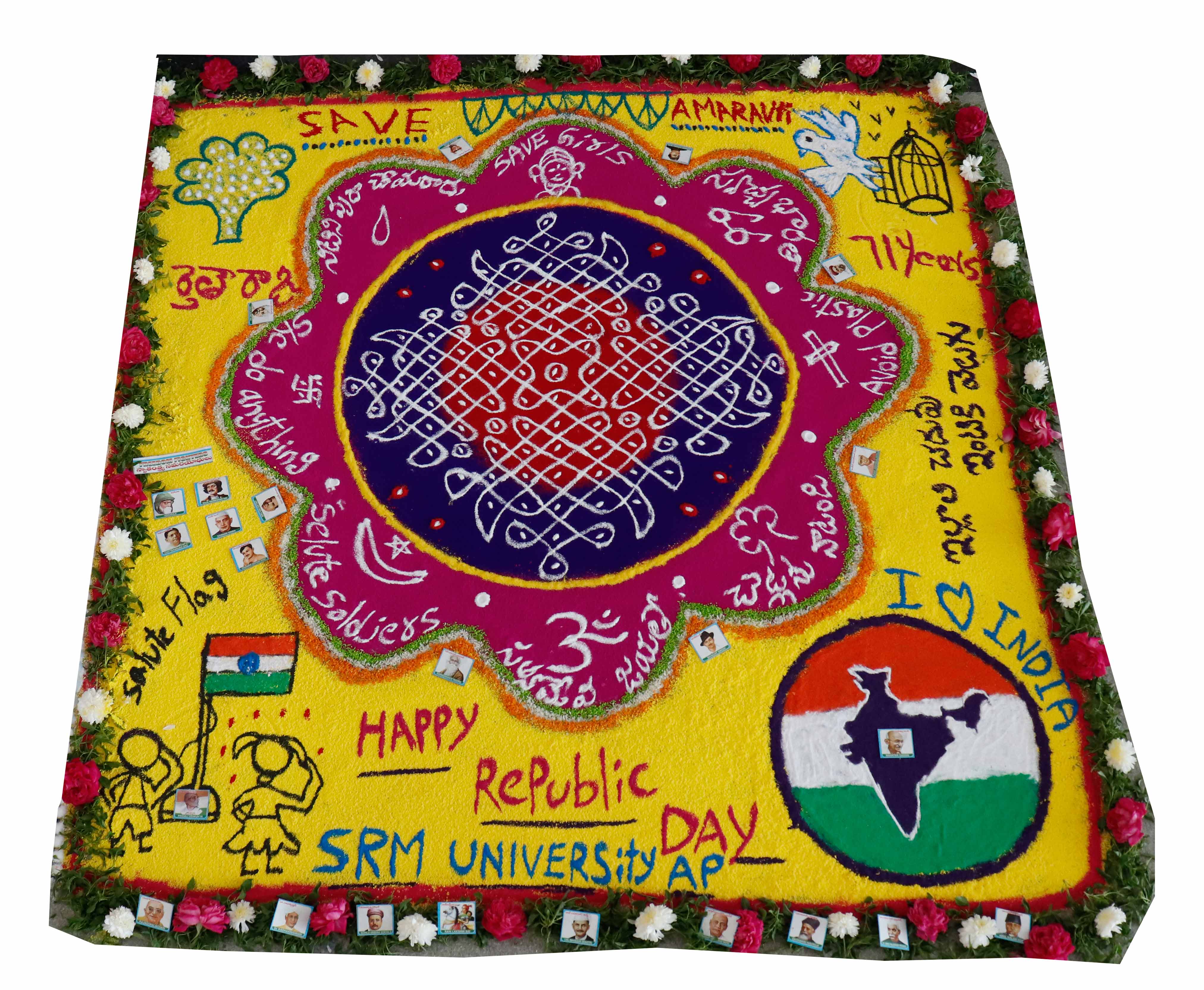
Close to dusk, the winners were declared and Ms. Manimanjari from Ravella village bagged the 1st prize by making a rangoli that pledges to save the environment and the society this republic day. Mrs. Bharati and Ms. Malleswari from Mangalagiri received the prize money for being the runner up and 1st runner up respectively.
Continue reading →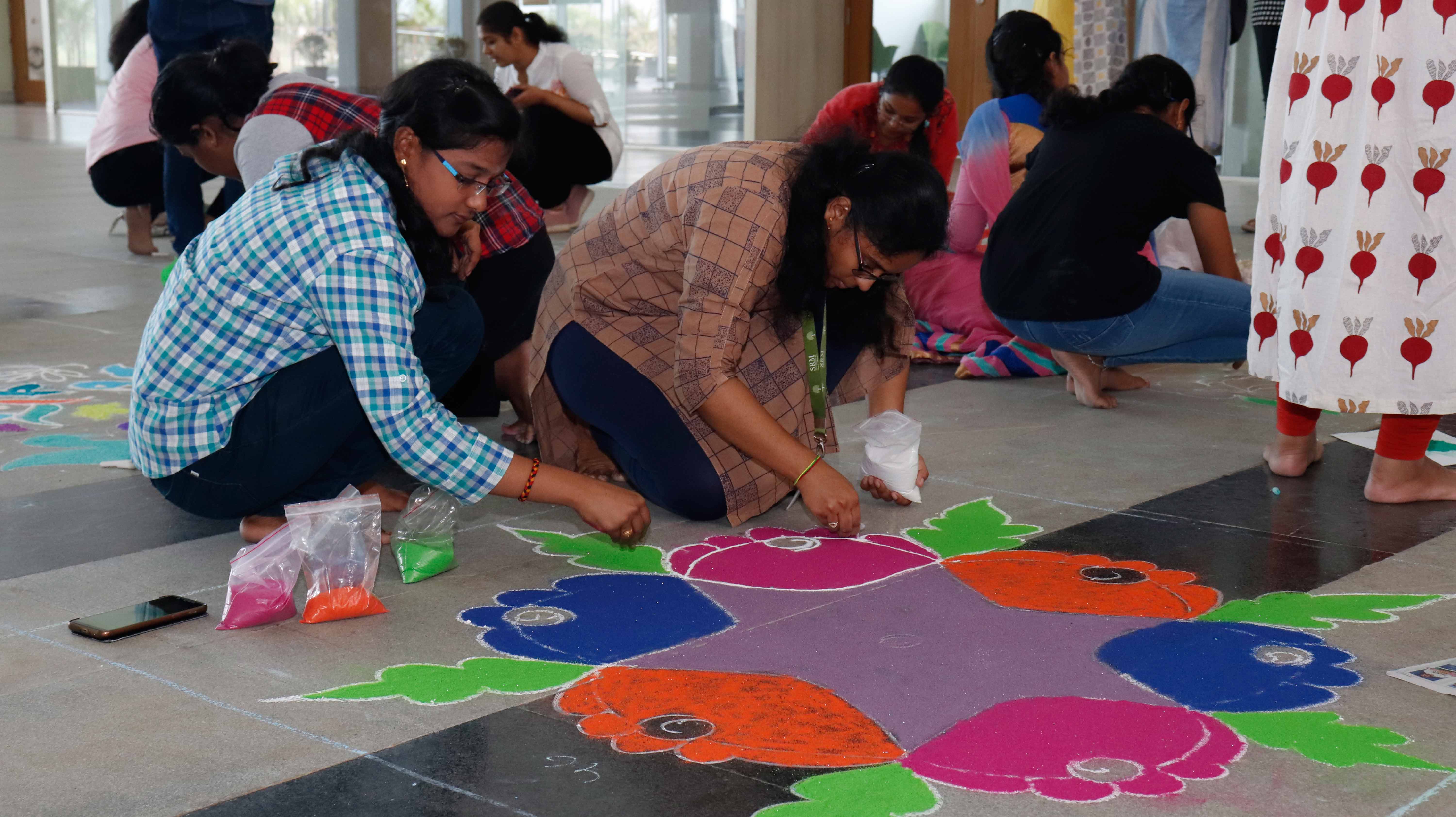
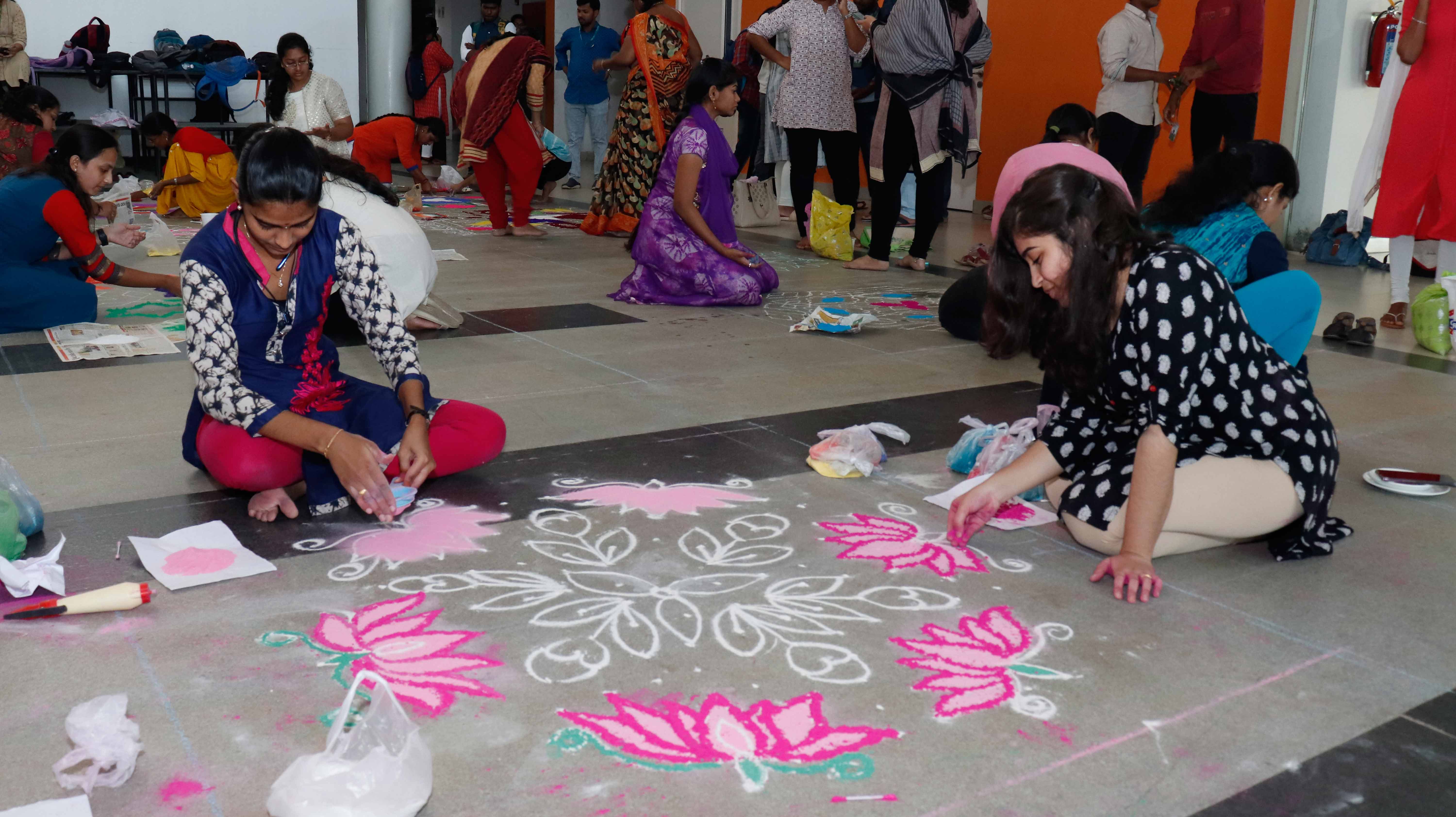
- Dr. Anil K. Suresh has been awarded gold medal for his impactful research January 23, 2020
Cancer research to address future challenges in early diagnosis and treatments
Association of Biotechnology and Pharmacy recognized the pioneering research of Dr. Anil K. Suresh, Associate Professor, Department of Biotechnology, SRM University, AP by honoring him with the “Outstanding Researcher Gold Medal Award” on December 20th, 2019 at Vignan’s Foundation for Science, Technology & Research, Guntur. Dr. Anil’s revolutionary research encompasses nano-technology enabled smart nanobeads for cancer theranostic and clinical medicine. Through his research, he designs nanoparticles for timely diagnosis and targeted treatment of the otherwise terminal diseases to solve future challenges in biomedicine. The primary objective of one of his DBT funded research projects “Direct removal of multi-drug resistant cells out of blood” is aimed at cancer specific Ab-mediated direct removal of leukemia out of our blood using nanomagnets as an alternative to chemotherapy.
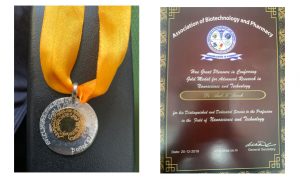
Mortality due to cancer has barely decreased in decades, despite an exponential increase in the development of efficient treatment processes. However, sub-groups of patients with a variety of tumor types including lung, bladder, and kidney have witnessed a dramatic curative success using immunotherapy. While such breakthroughs offer the hope of prolonged survival for some patients with advanced cancers, finding cancers at an early stage is a critical parameter that would substantially improve the chances of cure. The survival rates for patients with early diagnoses are five to ten times higher, accentuating the necessity of research targeting accurate diagnosis at an initial stage of cancer. Dr. Anil K Suresh along with his team researches to enable diagnosis and localized treatment of early stage invasive cancers (in some cases, pre-invasive states).
Dr. Anil recalls, “I was like any other researcher doing basic research on nanoscience and nanotechnology until I got an opportunity to work at Beckman Cancer Research Institute, where I often witnessed several cancer patients including young kids and women yelling in agony while undergoing chemo or radio therapy. Since then I became intensively stubborn, and am sincerely striving to the best of my abilities to diagnose and treat cancer, with an hope of giving cancer patients an human-friendly painless therapeutic option.
Continue reading →
What inspires me the most is my fervor to eradicate suffering and my passion to cure! I personally believe that suffering in any form is painful, especially when a person is diseased with hard to cure life threatening diseases such as HIV, Diabetes, Cancer, etc. “ - Photography Society celebrates with the innocents January 13, 2020
On 10th January 2019, Photography Society- SRM AP’s photography club, began its aspirational journey of helping the students follow their passion in photography. The club is headed by the in-house photographer, Hemanth Kumar K and started off with 25 student members.
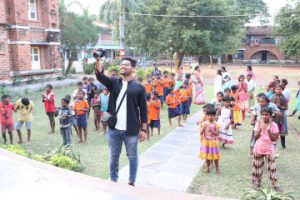
They have come a long way since then and celebrated their first anniversary with 80 kids in the orphanage- Chiguru Children’s Village.
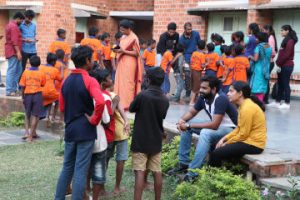
The student members of the club- Hemanth P, Hemanth N, Sathvik P, Jayanth S, Chetan M, Sadwika, and Harini along with their mentor Hemanth, Vineesh Sagar (Manager-Student Affairs), and Neelima Krishnakumar (Student Counsellor) arranged for 240 books, a large cake, and headed off to share their achievement and happiness with the kids at the orphanage.


The kids ecstatically enjoyed the fun-packed day playing games, eating cakes, and simply running around with the sheer joy of having people around them.

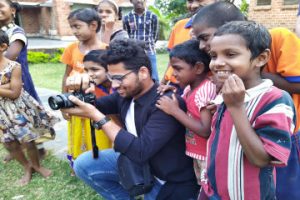

Hemanth Kumar says, “All this while we tried being unique when taking photographs, and the will to do something different on our club’s anniversary made us choose to spend the day sharing our happiness with the kids. On seeing them smile, we forgot our own struggles and problems, and thus, we plan to continue doing similar work in the coming days. When we look back a few years from now, we would know we captured the memories of the day in not just our cameras but imprinted them in our hearts”.
Continue reading →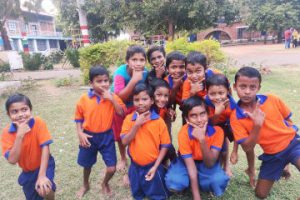
- SRM AP students under the guidance of Dr. Sumon Sinha attempts to offer cost-effective solution to weather forecast problems January 10, 2020
Faculty members of SRM AP-Dr. Venkata Nori and Dr. Jayaprakash Panchagnula (Department of Mechanical Engineering) and Dr. Anirban Ghosh (Department of Electronics and Communication Engineering) invited the celebrated researcher Dr. Sumon Sinha to visit our campus and conduct a three-day workshop on “Unmanned Aerial Vehicle (UAV) Design for Low Altitude Weather Data Acquisition”. Dr. Sinha did his B.Tech (Hons.) in Mechanical Engineering from IIT Kharagpur and his MS and Ph. D. from the University of Miami with specialization in Fluid Dynamics. After being associated as faculty in eminent institutes in the US including University of Mississippi, he delved into his business venture, Sinhatech in 2007 to provide innovative solutions to unresolved technical issues in Canada, USA, Japan, etc. Through his intuitive understanding of the subject, he developed and patented the Composite Flexible Surface Deturbulator to obtain higher controllability of drones in a high crosswind.

Dr. Sinha aims to offer solutions to certain fundamental problems in India through his expertise in aerodynamics. With his motivation to serve the country he has his roots attached to; he aims to build a team that would assist him to accomplish his dream project of using drones to gather weather reports on the sea surface at low altitude as well as general weather forecast data. “The sensors attached to the drone augmented with the deturbulator can gather critical data for accurate prediction of cyclones in the sea which the presently used Doppler Radar can only approximate”, says Dr. Sinha providing solutions to issues related to storm prediction. He further adds, “In India, weather stations use immensely expensive and non-reusable helium balloons embedded with sensors to capture data for general weather reports”. He intends to offer a cost-effective solution to these problems with reusable and less expensive drones.

On 3rd January, our faculty shortlisted a team of 15 enthusiastic students who worked on this assignment alongside Dr. Sinha. When asked what intrigued them regarding the workshop, N. Venkata Kishore Kumar Reddy (2nd year, ECE) says, “My father is in the Indian army which made me aspire to build a drone someday that can work as a spy for the army”.
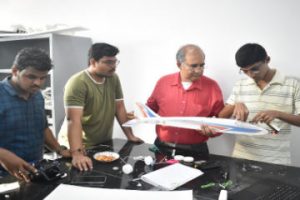
The workshop began with a lecture by Dr. Sinha where the students got a glimpse of the engineering concepts behind building a drone which can go up to 120 feet to gather atmospheric data.
Later, he demonstrated the flight of the drone where the students got hands-on experience in controlling the device.
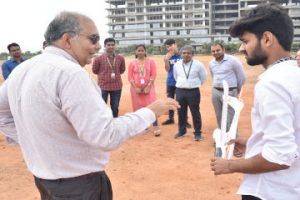
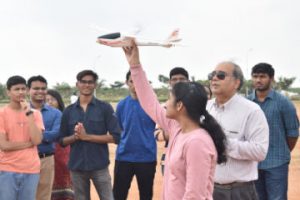
“I learned a lot about UAV from Dr. Sumon Sinha who is excellent in explaining the concept, he is also brilliant in flying RC objects. This knowledge will help us identify the various applications of the fixed wing plane-UAV in the future”, expresses M Raviteja (2nd year, ME).
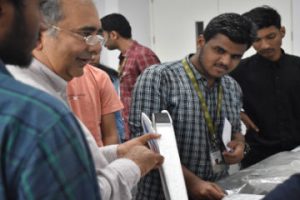
The students were then divided into three groups and were assigned the task of building a drone each.

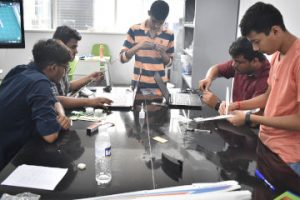
“The interactive sessions improved my knowledge on drones, air vehicles, and the basic aerodynamic science that works behind the flying objects” speaks Krishna Teja Vinnakota (1st year-CSE). On the last day of the workshop, the teams managed to develop three drones, one of which was embedded with the sensors that accurately captured data on temperature, humidity, atmospheric pressure, altitude, latitude, longitude, and dynamic pressure. “After having experience with the basic technicalities of building the drones, it is on us to improve its functionality and make it more usable” conforms Kishore who has already made an Agri Drone which can throw seeds coated with fertilizers in farming lands from a height of 4.5 meters above the ground. Inspired and educated from the workshop, our students plan to build a quadcopter in their next venture.
Continue reading →
- Dr. M.Radhakrishnan January 9, 2020
- Dr. Manjula R January 9, 2020
- Dr. Ayesha Parveen Haroon January 9, 2020
- Dr. Shuvendu Rana January 8, 2020
- Dr Ghanshyam Pandey January 8, 2020
- Career options after BA January 7, 2020
What are my career options after completing my BA?
Find yourself asking: after BA, what next? You’re not the only one. In science-and-tech-obsessed India, a bachelors in arts or a BA is often portrayed as a “lesser” option. Some parents even dissuade their children from an education in the arts, despite the student’s keen interest in a subject like history, political science, or English literature. The common assumption is that job prospects after a BA are poor. So, is that true? Absolutely not! As you will see through this article, your career options after a BA are rich and promising, with high-paying jobs after BA a reality. Apart from debunking the myth that a BA is a bad career choice, we would also want to stress on the importance of choosing your Bachelor’s degree according to your interest area, rather than what people think is popular. This way, you lay the foundation for a long and rewarding career that actually sustains your interest!
But first, what do I study in a BA?
In India, a BA degree is either a Pass course, in which you study a mix of subjects or an honours degree which specializes in one subject, such as a BA (Honours) in Political Science. Again, a BA Pass degree is regarded as inferior to an Honours degree, but fresh thinking suggests a Pass or multidisciplinary Bachelors may actually be useful from a career point of view because it trains you in many subjects. A Bachelors in Arts degree covers subjects in Liberal Arts, such as
- Languages, such as Hindi, English, Sanskrit, French and more
- Social Sciences, such as Economics, Political science, History, Psychology
- Humanities, such as English literature, Maths, Philosophy, Statistics, Journalism, and Fine Arts
What are Maths and Economics doing in a Bachelor of Arts?
Fun fact: Economics and Maths are traditionally recorded as Liberal Arts rather than science disciplines! Many colleges still offer a BA, rather than a BSc, in Maths. Since economics is a science about society, and since Maths is closely linked with music and art – think about fields like beats, dimension, perspective, and geometry – both of these are considered Arts subjects!
Where should I enrol for my BA?
Enrolling at a good college for your BA is important because this will give you a competitive advantage. If you’re planning to apply to a BA, work hard and ensure you have a good score in Class 12th so you can get the college and subject of your choice. Some of the best colleges for a BA in India are:
- Lady Sri Ram College, University of Delhi. Best for English, Economics, Maths, Psychology, Statistics, and Journalism
- St Stephen’s College, University of Delhi. Best for English, Philosophy, History, and Political Science
- Presidency College, Kolkata. Best for Political Science
- Christ Church University, Bangalore. Best for English and Economics
- Fergusson College, Pune. Best for Economics
- Loyola College, Chennai. Best for English, Economics, and Statistics
- SRM University, Andhra Pradesh. Best for Interdisciplinary Bachelors. You can customize 6-7 courses across Arts and Science disciplines.
- Ambedkar University, New Delhi. Best for Psychology and Fine Arts
- MS University Baroda. Best for Fine Arts
- Jawaharlal Nehru University, New Delhi. Best for BA in German, Spanish and other languages.
What are my career options after graduation in arts?
Like we’ve seen, the range of subjects covered under a BA degree are vast. Your career scope after a BA program will depend on your choice of subjects to a great extent. For example, A bachelors in English or communication will help you make a career in the media, while a BA in Statistics will prepare you for a career in insurance and risk management. However, one advantage of doing a BA is that your career choices are quite fluid; so, you can always for a career in advertising after a political science degree or pursue an MBA after an Honours in English. Based on whether you want to pursue advanced studies, or look for a job right after your BA, here are some career options:
Which is the best course after graduation in arts?
The best course is the one which most suits your interest and skills. Here are a few options you can choose from.
MA/ MPhil in your subject
In case you want to pursue a career in higher education and research, opt for a Master’s in your subject. You can be eligible to teach in a college after an MA if you qualify the National Eligibility Test (NET). You can further pursue an MPhil/ PhD from universities, such as University of Delhi, Jadavpur University, Kolkata, and SRM University, Amravati. Ever since the Sixth Pay Commission, educationists get very rewarding salaries.
Starting monthly salary for an ad-Hoc college professor: Rs 50,000 for a central university
Bachelors in Education
If you would like to teach at a school, you can pursue a Bachelors in Education, which is typically a two-year course. A B Ed qualifies you for school teaching, which is both lucrative and emotionally rewarding since you get to mentor the youth of tomorrow.
Starting monthly salary: Rs 25,000 upwards for pre-primary teachers; Rs 35,000 upwards for primary teachers
Law
After your 3-year B. A degree, you can appear for the Common Law Aptitude Test (CLAT) which enables you to get into a Bachelors of Law (LLB) program. After specializing in civil, criminal, corporate, or intellectual property law, you can join either a district or high court as a lawyer, or even work for the legal department of a firm. Where: National Law School of India University (NLSIU), Bangalore; Symbiosis Law School, Indian Law College (ILS), Pune; MSU, Baroda
Starting monthly salary: Varies greatly, starting from Rs 20,000 for a lawyer at a districts court
MBA
Students often ask: can I do an MBA after a BA in English or History? Of course, you can! A graduate from any discipline can apply for an MBA after a BA. You will be required to take the CAT for the IIMs and other entrance exams for institutes such as the IIMs, and other exams for institutes like XLRI, Jamshedpur and Indian School of Business, Hyderabad. A great option for MBA after your BA is MICA (once known as the Mudra Institute Communications, Ahmedabad) which offers an MBA in Marketing and Advertising. In an MBA, you can specialize in options such as finance, marketing, human resources, foreign trade, and more. Depending on your specialization, you can work as a manager in various departments of Indian and multinational companies, such as American Express bank, tech giants like Google and Intel technologies, and consulting firms like KPMG and Deloitte. Choose a specialization allied with your strengths to get the most out of your MBA degree.
Starting monthly salary: Graduates from tier-1 colleges like IIM Ahmedabad and ISB can expect a monthly average salary of Rs 1,25,000.
Postgraduate courses and diplomas in journalism
Have a distinctive voice and want to make it heard? A master or postgraduate diploma in business journalism after your B. Com prepares from institutes such as the Asian College of Journalism (ACJ), Chennai, and Indian Institute of Mass Communications (IIMC), Delhi prepares you for a career in print, TV, or digital media! You can work as a reporter, writer, or editor with a newspaper, news agency, TV channel, or website, depending on your preference and specialization. Popular employers in India are the Times Group, the Indian Express, TV18, and NDTV.
Starting monthly salary: Reputable print and digital media outlets pay a starting salary ranging from Rs 25,000 to Rs 40,000. For TV channels, the salary can go up to Rs 60,000.
Masters in Social Work
If you want to make a difference to the world around you, a Masters in Social Work is a good option. This course prepares you for a career with non-profits, in the corporate social responsibility arms of MNCs, healthcare, and counselling, depending on your stream of specialization. The Tata Institute of Social Sciences (TISS), Mumbai, as well as the Department of Social Work, University of Delhi offer very reputable Masters in Social Work (MSW) degrees.
Starting monthly salary: Rs 20,000 with small non-profits to Rs 50,000 and upwards for large non-profits, MNCs, hospitals, and governmental organizations.
What if I want to apply for a job after my BA?
You have many options here too. Some great options are listed below.
Government jobs after BA
Government jobs after a BA are a good option. A BA is especially useful in preparing you for the Indian Administrative Exams (IAS), and the Provincial Civil Services Exam (PCS) as many questions in the preliminary exams cover subjects such as Indian politics, history, and general knowledge. Most such competitive exams for the Central and state government require only a Bachelor’s degree, so they are always a good option.
Hot tip: Though subjects like political science and history are evergreen options for government exams, specializing in subjects like Sanskrit or Philosophy is also a good choice, since these subjects are high scoring.
Monthly salary range: Upwards of Rs 50,000 for IAS and PCS.
Defence jobs
After your BA, you can take the NDA (If you are under 19) or CDS (between the ages of 19 and 24) recruitment exams to join the defence forces. Apart from numerous perks, the monthly salary ranges for the lieutenant rank in the army is upwards of Rs 50,000 (basic pay).
Banking jobs
You can also take bank exams to join public sector banks, such as Bank of Baroda and Punjab National Bank, or the separate RBI exam for the Reserve Bank of India. The RBI exam is a great option, though quite competitive.
Starting monthly salary: upwards of Rs 38,000 for probationary officers (PO) in banks, Rs 68,000 for RBI Grade B officers (including basic pay and benefits)
Private jobs
Journalist
Journalism is a great career option after a BA in English. You can join a newspaper, television channel, or digital outlet as a reporter right after your graduation; though without a postgraduate diploma in journalism, you may be required to take an editing and general knowledge test. Remember to brush up on your language skills and reading before taking such an exam!
Starting monthly pay: Rs 25,000 upwards
Content writer
Writing for a website, blog, or business is a good option, especially if you are creative and good at secondary research. It helps if you establish a niche, such as education, lifestyle, business, or healthcare and specialize in it. You can work with businesses from Amazon to Myntra to Nykaa to Microsoft as a content writer. Often, you may be required to undertake a writing test.
Starting monthly salary: Depending on the size of the outfit, this can range from 15,000 to Rs 40,000 for Microsoft and Nykaa
Copywriter
Have a knack for coming up with catchy hashtags and memorable slogans? You have a good chance of joining an ad agency as a copywriter right after your BA. Most ad agencies, such as Leo Burnett, Ogilvy and Mather, and Dentsu will require you to take a copy test to evaluate your creativity and language skills.
Starting monthly pay: Rs 20,000 upwards
An executive with a multinational corporation
If you have a BA in subjects like Economics, Statistics, or Maths, you can join an MNC as an antry-level associate, consultant, or executive. Companies such as Price Waterhouse Cooper, JP Morgan, and McKinsey often hire freshers.
Starting monthly pay: Rs 30,000 upwards
Researcher
Whether it be news agencies, NGOs, or corporates, all organizations require researchers who can collect, process, and archive data. You can join news organizations such as NDTV, NGOs such as CRY and Goonj, or MNCs like Gartner as a researcher right after your BA.
Starting monthly pay: Rs 15, 000 (for small non-profits) to Rs 20,000 upwards (for larger NGOs, media agencies, and MNCs)
Translator
Have a BA in French, Spanish, Japanese, Urdu, or Sanskrit? Or are you fluent in more than one language and have a flair for translation? You can work as a translator for a publishing house, a multinational corporation, travel agencies, and embassies. Fluency in foreign languages, especially those that are tough to master, such as Japanese, can be especially lucrative.
Starting monthly salary: Rs 20,000 (for publishing houses) to Rs 40,000 upwards (for large translation agencies and MNCs)
PR Executive
All large organizations and many smaller ones have public relations arms, so there is no shortage of PR and marketing jobs. A Bachelors in English or communications presents an additional advantage in getting a job in public relations, marketing, and sales. Though starting salaries in these fields may be low, the ramp up can be fast if you exhibit good language, communication, and sales skills.
Starting monthly salary: Rs 15,000 upwards for small organizations to Rs 30,00 and more for larger companies
Graphic designer or illustrator
In a world increasingly attuned to the visual medium, this option is perfect for those with a Bachelors in Fine Arts. Advertising agencies, production houses, design and branding studios, as well as media houses, often require illustrators, so brush up your portfolio!
Starting monthly salary: Rs 25,000 and upwards
With all these options around, a Bachelor in Arts can be a hidden advantage, especially since studying humanities and liberal arts subjects often hone your communications skills and emotional quotient, factors that go a long way in building a fruitful career.
Continue reading →

